醉翁亭记1 2段翻译
- 格式:doc
- 大小:21.00 KB
- 文档页数:1
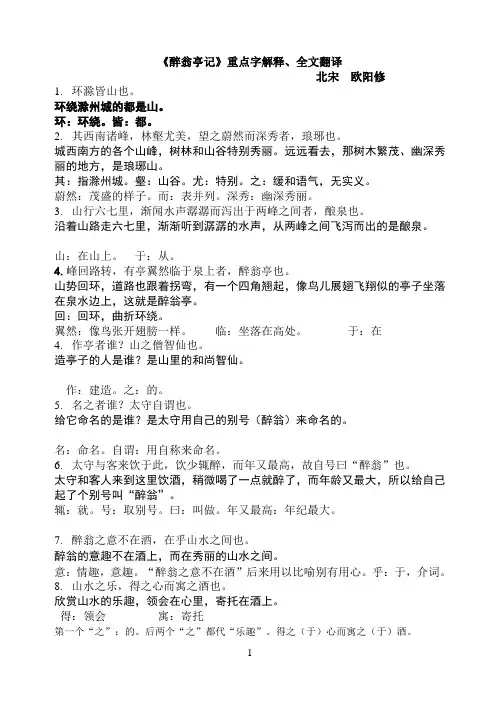
《醉翁亭记》重点字解释、全文翻译北宋欧阳修1.环滁皆山也。
环绕滁州城的都是山。
环:环绕。
皆:都。
2.其西南诸峰,林壑尤美,望之蔚然而深秀者,琅琊也。
城西南方的各个山峰,树林和山谷特别秀丽。
远远看去,那树木繁茂、幽深秀丽的地方,是琅琊山。
其:指滁州城。
壑:山谷。
尤:特别。
之:缓和语气,无实义。
蔚然:茂盛的样子。
而:表并列。
深秀:幽深秀丽。
3.山行六七里,渐闻水声潺潺而泻出于两峰之间者,酿泉也。
沿着山路走六七里,渐渐听到潺潺的水声,从两峰之间飞泻而出的是酿泉。
山:在山上。
于:从。
4.峰回路转,有亭翼然临于泉上者,醉翁亭也。
山势回环,道路也跟着拐弯,有一个四角翘起,像鸟儿展翅飞翔似的亭子坐落在泉水边上,这就是醉翁亭。
回:回环,曲折环绕。
翼然:像鸟张开翅膀一样。
临:坐落在高处。
于:在4.作亭者谁?山之僧智仙也。
造亭子的人是谁?是山里的和尚智仙。
作:建造。
之:的。
5.名之者谁?太守自谓也。
给它命名的是谁?是太守用自己的别号(醉翁)来命名的。
名:命名。
自谓:用自称来命名。
6.太守与客来饮于此,饮少辄醉,而年又最高,故自号曰“醉翁”也。
太守和客人来到这里饮酒,稍微喝了一点就醉了,而年龄又最大,所以给自己起了个别号叫“醉翁”。
辄:就。
号:取别号。
曰:叫做。
年又最高:年纪最大。
7.醉翁之意不在酒,在乎山水之间也。
醉翁的意趣不在酒上,而在秀丽的山水之间。
意:情趣,意趣。
“醉翁之意不在酒”后来用以比喻别有用心。
乎:于,介词。
8.山水之乐,得之心而寓之酒也。
欣赏山水的乐趣,领会在心里,寄托在酒上。
得:领会寓:寄托第一个“之”:的。
后两个“之”都代“乐趣”。
得之(于)心而寓之(于)酒。
9.若夫日出而林霏开,云归而岩穴暝,晦明变化者,山间之朝暮也。
又如太阳出来,树林里的雾气就散了;云气聚拢来,山谷就昏暗了。
或明或暗,变化不定之时,就是山间的清晨和傍晚。
10.霏:雾气。
开:消散归:聚拢。
冥(míng):昏暗。
晦(huì):阴暗。
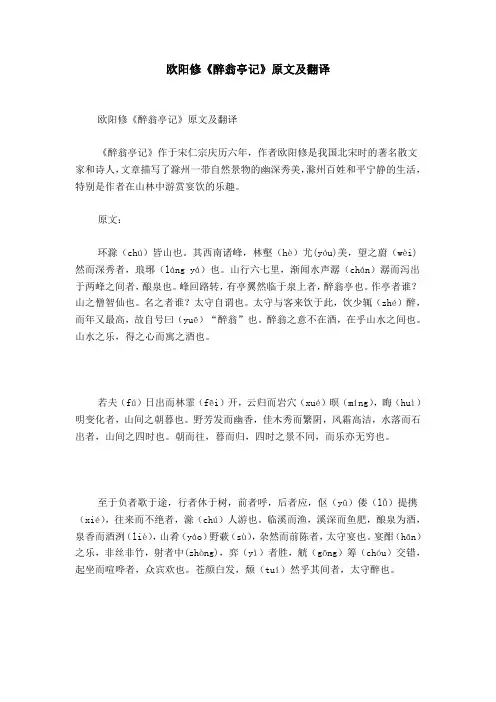
欧阳修《醉翁亭记》原文及翻译欧阳修《醉翁亭记》原文及翻译《醉翁亭记》作于宋仁宗庆历六年,作者欧阳修是我国北宋时的著名散文家和诗人,文章描写了滁州一带自然景物的幽深秀美,滁州百姓和平宁静的生活,特别是作者在山林中游赏宴饮的乐趣。
原文:环滁(chú)皆山也。
其西南诸峰,林壑(hè)尤(yóu)美,望之蔚(wèi)然而深秀者,琅琊(láng yá)也。
山行六七里,渐闻水声潺(chán)潺而泻出于两峰之间者,酿泉也。
峰回路转,有亭翼然临于泉上者,醉翁亭也。
作亭者谁?山之僧智仙也。
名之者谁?太守自谓也。
太守与客来饮于此,饮少辄(zhé)醉,而年又最高,故自号曰(yuē)“醉翁”也。
醉翁之意不在酒,在乎山水之间也。
山水之乐,得之心而寓之酒也。
若夫(fú)日出而林霏(fēi)开,云归而岩穴(xué)暝(míng),晦(huì)明变化者,山间之朝暮也。
野芳发而幽香,佳木秀而繁阴,风霜高洁,水落而石出者,山间之四时也。
朝而往,暮而归,四时之景不同,而乐亦无穷也。
至于负者歌于途,行者休于树,前者呼,后者应,伛(yǔ)偻(lǚ)提携(xié),往来而不绝者,滁(chú)人游也。
临溪而渔,溪深而鱼肥,酿泉为酒,泉香而酒洌(liè),山肴(yáo)野蔌(sù),杂然而前陈者,太守宴也。
宴酣(hān)之乐,非丝非竹,射者中(zhòng),弈(yì)者胜,觥(gōng)筹(chóu)交错,起坐而喧哗者,众宾欢也。
苍颜白发,颓(tuí)然乎其间者,太守醉也。
已而夕阳在山,人影散乱,太守归而宾客从也。
树林阴翳(yì),鸣声上下,游人去而禽鸟乐也。
然而禽鸟知山林之乐,而不知人之乐;人知从太守游而乐,而不知太守之乐其乐也。
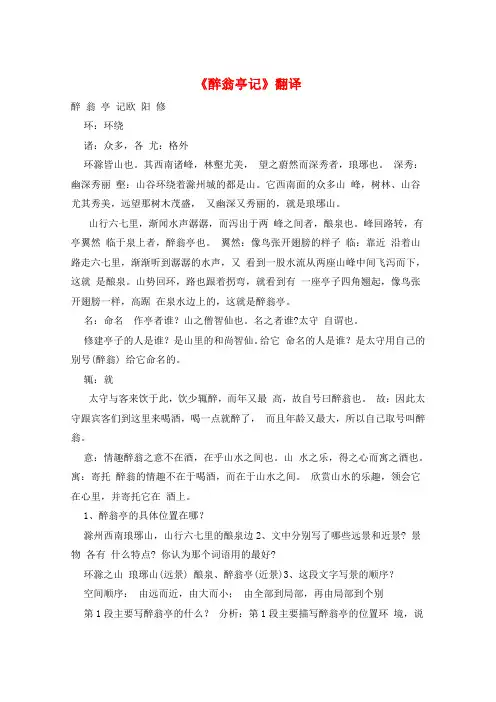
《醉翁亭记》翻译醉翁亭记欧阳修环:环绕诸:众多,各尤:格外环滁皆山也。
其西南诸峰,林壑尤美,望之蔚然而深秀者,琅琊也。
深秀:幽深秀丽壑:山谷环绕着滁州城的都是山。
它西南面的众多山峰,树林、山谷尤其秀美,远望那树木茂盛,又幽深又秀丽的,就是琅琊山。
山行六七里,渐闻水声潺潺,而泻出于两峰之间者,酿泉也。
峰回路转,有亭翼然临于泉上者,醉翁亭也。
翼然:像鸟张开翅膀的样子临:靠近沿着山路走六七里,渐渐听到潺潺的水声,又看到一股水流从两座山峰中间飞泻而下,这就是酿泉。
山势回环,路也跟着拐弯,就看到有一座亭子四角翘起,像鸟张开翅膀一样,高踞在泉水边上的,这就是醉翁亭。
名:命名作亭者谁?山之僧智仙也。
名之者谁?太守自谓也。
修建亭子的人是谁?是山里的和尚智仙。
给它命名的人是谁?是太守用自己的别号(醉翁) 给它命名的。
辄:就太守与客来饮于此,饮少辄醉,而年又最高,故自号曰醉翁也。
故:因此太守跟宾客们到这里来喝酒,喝一点就醉了,而且年龄又最大,所以自己取号叫醉翁。
意:情趣醉翁之意不在酒,在乎山水之间也。
山水之乐,得之心而寓之酒也。
寓:寄托醉翁的情趣不在于喝酒,而在于山水之间。
欣赏山水的乐趣,领会它在心里,并寄托它在酒上。
1、醉翁亭的具体位置在哪?滁州西南琅琊山,山行六七里的酿泉边2、文中分别写了哪些远景和近景? 景物各有什么特点? 你认为那个词语用的最好?环滁之山琅琊山(远景) 酿泉、醉翁亭(近景)3、这段文字写景的顺序?空间顺序:由远而近,由大而小;由全部到局部,再由局部到个别第1段主要写醉翁亭的什么?分析:第1段主要描写醉翁亭的位置环境,说明醉翁亭的命名缘由。
醉翁亭建在滁州西南树木茂盛,深幽秀丽的琅琊山间酿泉边上;亭是山僧智仙修建的,亭名是自号“醉翁”、情怡山水的太守定的。
开:散开霏:雾气暝:昏暗若夫日出而林霏开,云归而岩穴暝,晦明变化者,山间之朝暮也。
晦:昏暗像那太阳出来,林间的雾气散开了,烟云聚拢来,岩谷洞穴就显得昏暗了,明暗交替的景象,就是山间的清晨和傍晚。
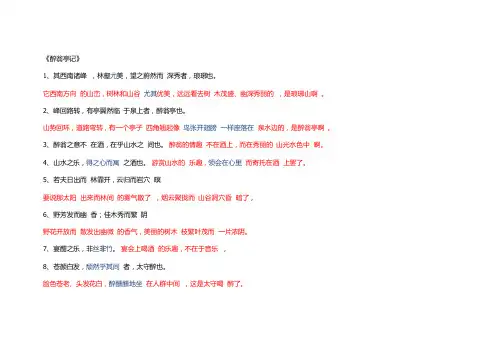
《醉翁亭记》
1、其西南诸峰,林壑尤美,望之蔚然而深秀者,琅琊也。
它西南方向的山峦,树林和山谷尤其优美,远远看去树木茂盛、幽深秀丽的,是琅琊山啊。
2、峰回路转,有亭翼然临于泉上者,醉翁亭也。
山势回环,道路弯转,有一个亭子四角翘起像鸟张开翅膀一样座落在泉水边的,是醉翁亭啊。
3、醉翁之意不在酒,在乎山水之间也。
醉翁的情趣不在酒上,而在秀丽的山光水色中啊。
4、山水之乐,得之心而寓之酒也。
游赏山水的乐趣,领会在心里而寄托在酒上罢了。
5、若夫日出而林霏开,云归而岩穴暝
要说那太阳出来而林间的雾气散了,烟云聚拢而山谷洞穴昏暗了,
6、野芳发而幽香;佳木秀而繁阴
野花开放而散发出幽微的香气,美丽的树木枝繁叶茂而一片浓阴。
7、宴酣之乐,非丝非竹。
宴会上喝酒的乐趣,不在于音乐,
8、苍颜白发,颓然乎其间者,太守醉也。
脸色苍老、头发花白,醉醺醺地坐在人群中间,这是太守喝醉了。
9、醉能同其乐,醒能述以文者,太守也。
醉了能和他们一起快乐,酒醒后能写文章表达这种快乐的,是太守啊。
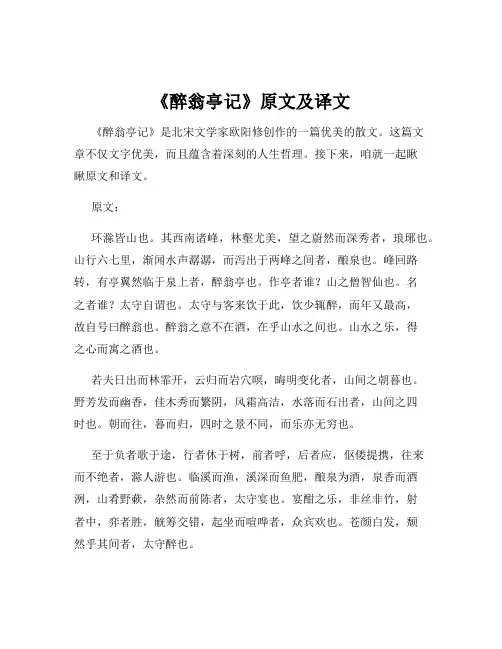
《醉翁亭记》原文及译文《醉翁亭记》是北宋文学家欧阳修创作的一篇优美的散文。
这篇文章不仅文字优美,而且蕴含着深刻的人生哲理。
接下来,咱就一起瞅瞅原文和译文。
原文:环滁皆山也。
其西南诸峰,林壑尤美,望之蔚然而深秀者,琅琊也。
山行六七里,渐闻水声潺潺,而泻出于两峰之间者,酿泉也。
峰回路转,有亭翼然临于泉上者,醉翁亭也。
作亭者谁?山之僧智仙也。
名之者谁?太守自谓也。
太守与客来饮于此,饮少辄醉,而年又最高,故自号曰醉翁也。
醉翁之意不在酒,在乎山水之间也。
山水之乐,得之心而寓之酒也。
若夫日出而林霏开,云归而岩穴暝,晦明变化者,山间之朝暮也。
野芳发而幽香,佳木秀而繁阴,风霜高洁,水落而石出者,山间之四时也。
朝而往,暮而归,四时之景不同,而乐亦无穷也。
至于负者歌于途,行者休于树,前者呼,后者应,伛偻提携,往来而不绝者,滁人游也。
临溪而渔,溪深而鱼肥,酿泉为酒,泉香而酒洌,山肴野蔌,杂然而前陈者,太守宴也。
宴酣之乐,非丝非竹,射者中,弈者胜,觥筹交错,起坐而喧哗者,众宾欢也。
苍颜白发,颓然乎其间者,太守醉也。
已而夕阳在山,人影散乱,太守归而宾客从也。
树林阴翳,鸣声上下,游人去而禽鸟乐也。
然而禽鸟知山林之乐,而不知人之乐;人知从太守游而乐,而不知太守之乐其乐也。
醉能同其乐,醒能述以文者,太守也。
太守谓谁?庐陵欧阳修也。
译文:环绕着滁州城的都是山。
它西南面的许多山峰,树林和山谷尤其优美,远远望去那树木茂盛,又幽深又秀丽的地方,是琅琊山。
沿着山路走六七里,渐渐听到潺潺的水声,从两座山峰中间倾泻出来的,是酿泉。
山势回环,路也跟着转弯,有一座亭子四角翘起,像鸟张开翅膀一样,高踞在泉水上边的,是醉翁亭。
修建亭子的人是谁?是山中的和尚智仙。
给它取名的人是谁?是太守用自己的别号(醉翁)来命名的。
太守和客人到这里来喝酒,喝一点就醉了,而且年龄又最大,所以自己取号叫醉翁。
醉翁的情趣不在于喝酒,而在于山水之间。
欣赏山水的乐趣,领会在心里,寄托在酒上。
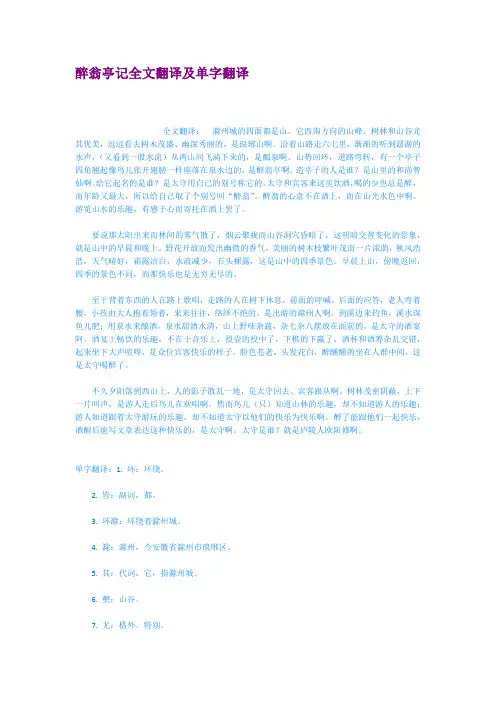
醉翁亭记全文翻译及单字翻译全文翻译:滁州城的四面都是山。
它西南方向的山峰,树林和山谷尤其优美,远远看去树木茂盛、幽深秀丽的,是琅琊山啊。
沿着山路走六七里,渐渐的听到潺潺的水声,(又看到一股水流)从两山间飞淌下来的,是酿泉啊。
山势回环,道路弯转,有一个亭子四角翘起像鸟儿张开翅膀一样座落在泉水边的,是醉翁亭啊。
造亭子的人是谁?是山里的和尚智仙啊。
给它起名的是谁?是太守用自己的别号称它的。
太守和宾客来这里饮酒,喝的少也总是醉,而年龄又最大,所以给自己取了个别号叫“醉翁”。
醉翁的心意不在酒上,而在山光水色中啊。
游览山水的乐趣,有感于心而寄托在酒上罢了。
要说那太阳出来而林间的雾气散了,烟云聚拢而山谷洞穴昏暗了,这明暗交替变化的景象,就是山中的早晨和晚上。
野花开放而发出幽微的香气,美丽的树木枝繁叶茂而一片浓荫,秋风浩浩,天气晴好,霜露洁白,水流减少,石头裸露,这是山中的四季景色。
早晨上山,傍晚返回,四季的景色不同,而那快乐也是无穷无尽的。
至于背着东西的人在路上歌唱,走路的人在树下休息,前面的呼喊,后面的应答,老人弯着腰,小孩由大人抱着领着,来来往往,络绎不绝的,是出游的滁州人啊。
到溪边来钓鱼,溪水深鱼儿肥;用泉水来酿酒,泉水甜酒水清,山上野味杂蔬,杂七杂八摆放在面前的,是太守的酒宴阿。
酒宴上畅饮的乐趣,不在于音乐上,投壶的投中了,下棋的下赢了,酒杯和酒筹杂乱交错,起来坐下大声喧哗,是众位宾客快乐的样子。
脸色苍老,头发花白,醉醺醺的坐在人群中间,这是太守喝醉了。
不久夕阳落到西山上,人的影子散乱一地,是太守回去、宾客跟从啊。
树林茂密阴蔽,上下一片叫声,是游人走后鸟儿在欢唱啊。
然而鸟儿(只)知道山林的乐趣,却不知道游人的乐趣;游人知道跟着太守游玩的乐趣,却不知道太守以他们的快乐为快乐啊。
醉了能跟他们一起快乐,酒醒后能写文章表达这种快乐的,是太守啊。
太守是谁?就是庐陵人欧阳修啊。
单字翻译:1. 环:环绕。
2. 皆:副词,都。
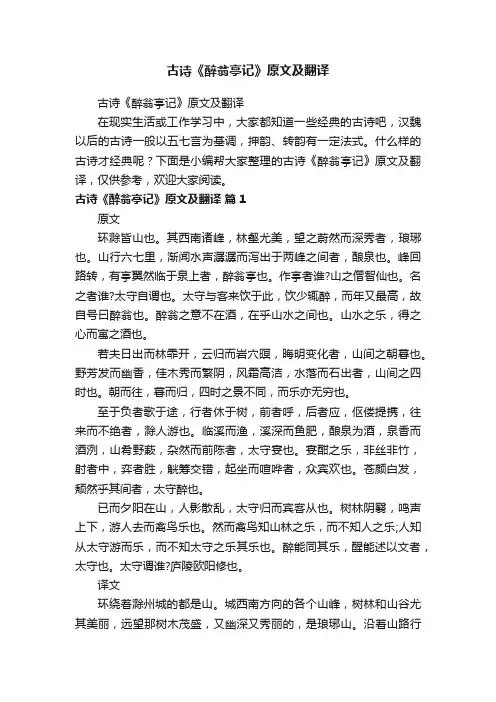
古诗《醉翁亭记》原文及翻译古诗《醉翁亭记》原文及翻译在现实生活或工作学习中,大家都知道一些经典的古诗吧,汉魏以后的古诗一般以五七言为基调,押韵、转韵有一定法式。
什么样的古诗才经典呢?下面是小编帮大家整理的古诗《醉翁亭记》原文及翻译,仅供参考,欢迎大家阅读。
古诗《醉翁亭记》原文及翻译篇1原文环滁皆山也。
其西南诸峰,林壑尤美,望之蔚然而深秀者,琅琊也。
山行六七里,渐闻水声潺潺而泻出于两峰之间者,酿泉也。
峰回路转,有亭翼然临于泉上者,醉翁亭也。
作亭者谁?山之僧智仙也。
名之者谁?太守自谓也。
太守与客来饮于此,饮少辄醉,而年又最高,故自号曰醉翁也。
醉翁之意不在酒,在乎山水之间也。
山水之乐,得之心而寓之酒也。
若夫日出而林霏开,云归而岩穴暝,晦明变化者,山间之朝暮也。
野芳发而幽香,佳木秀而繁阴,风霜高洁,水落而石出者,山间之四时也。
朝而往,暮而归,四时之景不同,而乐亦无穷也。
至于负者歌于途,行者休于树,前者呼,后者应,伛偻提携,往来而不绝者,滁人游也。
临溪而渔,溪深而鱼肥,酿泉为酒,泉香而酒洌,山肴野蔌,杂然而前陈者,太守宴也。
宴酣之乐,非丝非竹,射者中,弈者胜,觥筹交错,起坐而喧哗者,众宾欢也。
苍颜白发,颓然乎其间者,太守醉也。
已而夕阳在山,人影散乱,太守归而宾客从也。
树林阴翳,鸣声上下,游人去而禽鸟乐也。
然而禽鸟知山林之乐,而不知人之乐;人知从太守游而乐,而不知太守之乐其乐也。
醉能同其乐,醒能述以文者,太守也。
太守谓谁?庐陵欧阳修也。
译文环绕着滁州城的都是山。
城西南方向的各个山峰,树林和山谷尤其美丽,远望那树木茂盛,又幽深又秀丽的,是琅琊山。
沿着山路行走了六七里,渐渐地听到潺潺的流水声,从两座山峰中间倾泻而下的,是酿泉。
山势回环,路也跟着拐弯,有一座亭子四角翘起,像鸟张开翅膀一样,坐落在泉水边上,这就是醉翁亭。
修建亭子的人是谁?是山里的老僧智仙。
给它起名字的人是谁?是太守用自己的别号(醉翁)来命名的。
太守和宾客来这里喝酒,喝一点就醉了,而年纪又最大,所以给自己起了个名号叫醉翁。
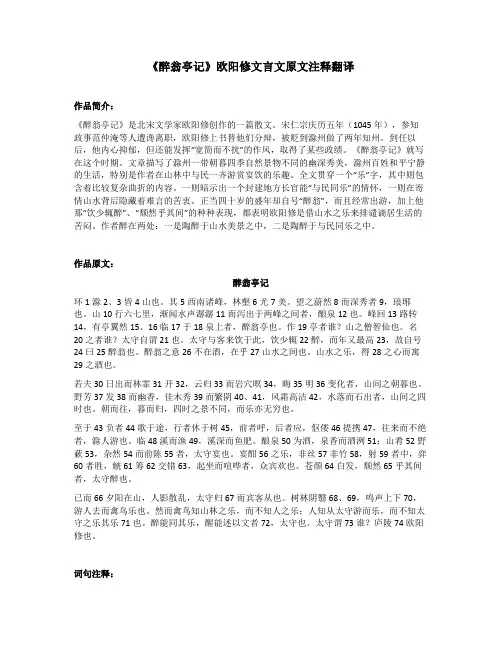
《醉翁亭记》欧阳修文言文原文注释翻译作品简介:《醉翁亭记》是北宋文学家欧阳修创作的一篇散文。
宋仁宗庆历五年(1045年),参知政事范仲淹等人遭谗离职,欧阳修上书替他们分辩,被贬到滁州做了两年知州。
到任以后,他内心抑郁,但还能发挥“宽简而不扰”的作风,取得了某些政绩。
《醉翁亭记》就写在这个时期。
文章描写了滁州一带朝暮四季自然景物不同的幽深秀美,滁州百姓和平宁静的生活,特别是作者在山林中与民一齐游赏宴饮的乐趣。
全文贯穿一个“乐”字,其中则包含着比较复杂曲折的内容。
一则暗示出一个封建地方长官能“与民同乐”的情怀,一则在寄情山水背后隐藏着难言的苦衷。
正当四十岁的盛年却自号“醉翁”,而且经常出游,加上他那“饮少辄醉”、“颓然乎其间”的种种表现,都表明欧阳修是借山水之乐来排谴谪居生活的苦闷。
作者醉在两处:一是陶醉于山水美景之中,二是陶醉于与民同乐之中。
作品原文:醉翁亭记环1滁2、3皆4山也。
其5西南诸峰,林壑6尤7美。
望之蔚然8而深秀者9,琅琊也。
山10行六七里,渐闻水声潺潺11而泻出于两峰之间者,酿泉12也。
峰回13路转14,有亭翼然15、16临17于18泉上者,醉翁亭也。
作19亭者谁?山之僧智仙也。
名20之者谁?太守自谓21也。
太守与客来饮于此,饮少辄22醉,而年又最高23,故自号24曰25醉翁也。
醉翁之意26不在酒,在乎27山水之间也。
山水之乐,得28之心而寓29之酒也。
若夫30日出而林霏31开32,云归33而岩穴暝34,晦35明36变化者,山间之朝暮也。
野芳37发38而幽香,佳木秀39而繁阴40、41,风霜高洁42,水落而石出者,山间之四时也。
朝而往,暮而归,四时之景不同,而乐亦无穷也。
至于43负者44歌于途,行者休于树45,前者呼,后者应,伛偻46提携47,往来而不绝者,滁人游也。
临48溪而渔49,溪深而鱼肥。
酿泉50为酒,泉香而酒洌51;山肴52野蔌53,杂然54而前陈55者,太守宴也。
宴酣56之乐,非丝57非竹58,射59者中,弈60者胜,觥61筹62交错63,起坐而喧哗者,众宾欢也。
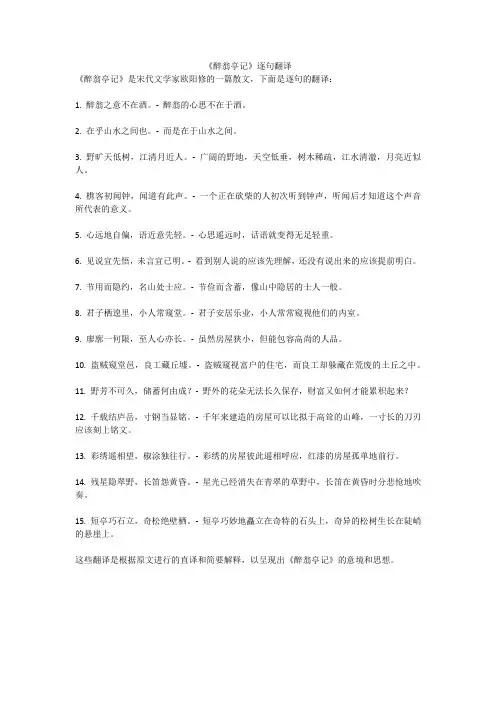
《醉翁亭记》逐句翻译《醉翁亭记》是宋代文学家欧阳修的一篇散文,下面是逐句的翻译:1. 醉翁之意不在酒。
-醉翁的心思不在于酒。
2. 在乎山水之间也。
-而是在于山水之间。
3. 野旷天低树,江清月近人。
-广阔的野地,天空低垂,树木稀疏,江水清澈,月亮近似人。
4. 樵客初闻钟,闻道有此声。
-一个正在砍柴的人初次听到钟声,听闻后才知道这个声音所代表的意义。
5. 心远地自偏,语近意先轻。
-心思遥远时,话语就变得无足轻重。
6. 见说宜先悟,未言宜已明。
-看到别人说的应该先理解,还没有说出来的应该提前明白。
7. 节用而隐约,名山处士应。
-节俭而含蓄,像山中隐居的士人一般。
8. 君子栖遑里,小人常窥堂。
-君子安居乐业,小人常常窥视他们的内室。
9. 廖廓一何限,至人心亦长。
-虽然房屋狭小,但能包容高尚的人品。
10. 盗贼窥堂邑,良工藏丘墟。
-盗贼窥视富户的住宅,而良工却躲藏在荒废的土丘之中。
11. 野芳不可久,储蓄何由成?-野外的花朵无法长久保存,财富又如何才能累积起来?12. 千载结庐岳,寸钢当显铭。
-千年来建造的房屋可以比拟于高耸的山峰,一寸长的刀刃应该刻上铭文。
13. 彩绣遥相望,椒涂独往行。
-彩绣的房屋彼此遥相呼应,红漆的房屋孤单地前行。
14. 残星隐翠野,长笛怨黄昏。
-星光已经消失在青翠的草野中,长笛在黄昏时分悲怆地吹奏。
15. 短亭巧石立,奇松绝壁栖。
-短亭巧妙地矗立在奇特的石头上,奇异的松树生长在陡峭的悬崖上。
这些翻译是根据原文进行的直译和简要解释,以呈现出《醉翁亭记》的意境和思想。
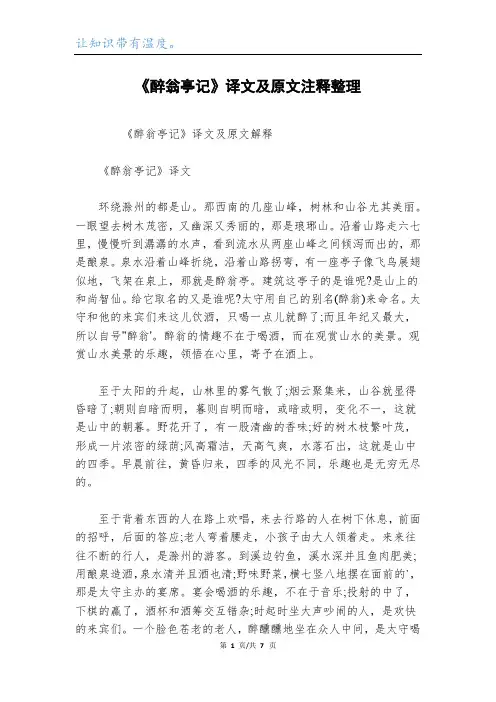
《醉翁亭记》译文及原文注释整理《醉翁亭记》译文及原文解释《醉翁亭记》译文环绕滁州的都是山。
那西南的几座山峰,树林和山谷尤其美丽。
一眼望去树木茂密,又幽深又秀丽的,那是琅琊山。
沿着山路走六七里,慢慢听到潺潺的水声,看到流水从两座山峰之间倾泻而出的,那是酿泉。
泉水沿着山峰折绕,沿着山路拐弯,有一座亭子像飞鸟展翅似地,飞架在泉上,那就是醉翁亭。
建筑这亭子的是谁呢?是山上的和尚智仙。
给它取名的又是谁呢?太守用自己的别名(醉翁)来命名。
太守和他的来宾们来这儿饮酒,只喝一点儿就醉了;而且年纪又最大,所以自号"醉翁'。
醉翁的情趣不在于喝酒,而在观赏山水的美景。
观赏山水美景的乐趣,领悟在心里,寄予在酒上。
至于太阳的升起,山林里的雾气散了;烟云聚集来,山谷就显得昏暗了;朝则自暗而明,暮则自明而暗,或暗或明,变化不一,这就是山中的朝暮。
野花开了,有一股清幽的香味;好的树木枝繁叶茂,形成一片浓密的绿荫;风高霜洁,天高气爽,水落石出,这就是山中的四季。
早晨前往,黄昏归来,四季的风光不同,乐趣也是无穷无尽的。
至于背着东西的人在路上欢唱,来去行路的人在树下休息,前面的招呼,后面的答应;老人弯着腰走,小孩子由大人领着走。
来来往往不断的行人,是滁州的游客。
到溪边钓鱼,溪水深并且鱼肉肥美;用酿泉造酒,泉水清并且酒也清;野味野菜,横七竖八地摆在面前的`,那是太守主办的宴席。
宴会喝酒的乐趣,不在于音乐;投射的中了,下棋的赢了,酒杯和酒筹交互错杂;时起时坐大声吵闹的人,是欢快的来宾们。
一个脸色苍老的老人,醉醺醺地坐在众人中间,是太守喝醉了。
不久,太阳下山了,人影散乱,来宾们跟随太守回去了。
树林里的枝叶茂密成林,鸟儿处处叫,是游人离开后鸟儿在欢快地跳动。
但是鸟儿只知道山林中的欢乐,却不知道人们的欢乐。
而人们只知道跟随太守游玩的欢乐,却不知道太守以游人的欢乐为欢乐啊。
醉了能够和大家一起欢快,醒来能够用文章记述这乐事的人,那就是太守啊。
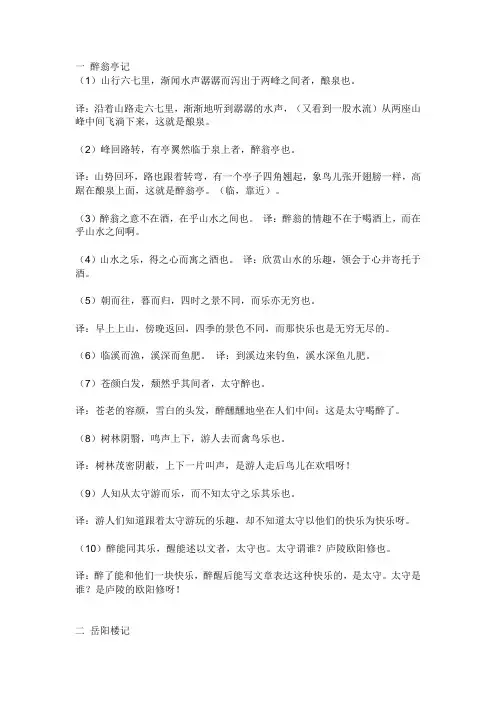
一醉翁亭记(1)山行六七里,渐闻水声潺潺而泻出于两峰之间者,酿泉也。
译:沿着山路走六七里,渐渐地听到潺潺的水声,(又看到一股水流)从两座山峰中间飞淌下来,这就是酿泉。
(2)峰回路转,有亭翼然临于泉上者,醉翁亭也。
译:山势回环,路也跟着转弯,有一个亭子四角翘起,象鸟儿张开翅膀一样,高踞在酿泉上面,这就是醉翁亭。
(临,靠近)。
(3)醉翁之意不在酒,在乎山水之间也。
译:醉翁的情趣不在于喝酒上,而在乎山水之间啊。
(4)山水之乐,得之心而寓之酒也。
译:欣赏山水的乐趣,领会于心并寄托于酒。
(5)朝而往,暮而归,四时之景不同,而乐亦无穷也。
译:早上上山,傍晚返回,四季的景色不同,而那快乐也是无穷无尽的。
(6)临溪而渔,溪深而鱼肥。
译:到溪边来钓鱼,溪水深鱼儿肥。
(7)苍颜白发,颓然乎其间者,太守醉也。
译:苍老的容颜,雪白的头发,醉醺醺地坐在人们中间:这是太守喝醉了。
(8)树林阴翳,鸣声上下,游人去而禽鸟乐也。
译:树林茂密阴蔽,上下一片叫声,是游人走后鸟儿在欢唱呀!(9)人知从太守游而乐,而不知太守之乐其乐也。
译:游人们知道跟着太守游玩的乐趣,却不知道太守以他们的快乐为快乐呀。
(10)醉能同其乐,醒能述以文者,太守也。
太守谓谁?庐陵欧阳修也。
译:醉了能和他们一块快乐,醉醒后能写文章表达这种快乐的,是太守。
太守是谁?是庐陵的欧阳修呀!二岳阳楼记1、越明年,政通人和,百废具兴。
译:到了第二年,政事推行顺利,百姓安居乐业,各种荒废了的事业都兴办起来了。
(具,同"俱")。
2、览物之情,得无异乎?译:观赏景物时的心情大概有所不同吧?3、若夫霪雨霏霏,连月不开。
译:在那春雨连绵不断,整月不晴的时候(开,放晴)4、至若青和景明,波澜不惊译:待到春风和煦,阳光明媚、湖面平静(景,日光。
惊,有"起"、"动"的意思)5、去国怀乡,忧谗畏讥译:离开国都,怀念家乡,担心(人家)说坏话,惧怕(人家)批评指责。
欧阳修·《醉翁亭记》英译环滁皆山也。
其西南诸峰,林壑尤美。
望之蔚然而深秀者,琅琊也。
山行六七里,渐闻水声潺潺,而泄出于两峰之间者,酿泉也。
峰回路转,有亭翼然临于泉上者,醉翁亭也。
作亭者谁?山之僧曰智仙也。
名之者谁?太守自谓也。
太守与客来饮于此,饮少辄醉,而年又最高,故自号曰“醉翁”也。
醉翁之意不在酒,在乎山水之间也。
山水之乐,得之心而寓之酒也。
若夫日出而林霏开,云归而岩穴暝,晦明变化者,山间之朝暮也。
野芳发而幽香,佳木秀而繁阴,风霜高洁,水落而石出者,山间之四时也。
朝而往,暮而归,四时之景不同,而乐亦无穷也。
至于负者歌于途,行者休于树,前者呼,后者应,伛偻提携,往来而不绝者,滁人游也。
临溪而渔,溪深而鱼肥;酿泉为酒,泉香而酒冽;山肴野蔌,杂然而前陈者,太守宴也。
宴酣之乐,非丝非竹,射者中,弈者胜,觥筹交错,坐起而喧哗者,众宾欢也。
苍然白发,颓然乎其中者,太守醉也。
已而夕阳在山,人影散乱,太守归而宾客从也。
树林阴翳,鸣声上下,游人去而禽鸟乐也。
然而禽鸟知山林之乐,而不知人之乐;人知从太守游而乐,而不知太守之乐其乐也。
醉能同其乐,醒能述以文者,太守也。
太守谓谁?庐陵欧阳修也。
The Roadside Hut of the Old DrunkardOuyang XiuThe District of Chu is enclosed all around by hills, of which those in the southwest boast the most lovely forests and dales. In the distance, densely wooded and possessed of a rugged beauty, is Mt. Langya. When you penetrate a mile or two into this mountain you begin to hear the gurgling of a stream, and presently the stream — the Brewer's Spring — comes into sight cascading between two peaks. Rounding a bend you see a hut with a spreading roof by the stream, and this is the Roadside Hut of the Old Drunkard. This hut was built by the monk Zhixian. It was given its name by the governor, referring to himself. The governor, coming here with his friends, often gets tipsy after a little drinking; and since he is the most advanced in years, he calls himself the Old Drunkard. He delights less in drinkingthan in the hills and streams, taking pleasure in them and expressing the feeling in his heart through drinking.Now at dawn and dusk in this mountain come the changes between light and darkness: when the sun emerges, the misty woods become clear; when the clouds hang low, the grottoes are wrapped in gloom. Then in the course of the four seasons, You find wild flowers burgeoning and blooming with a secret fragrance, the stately trees put on their mantle of leaves and give a goodly shade, until wind and frost touch all with austerity, the water sinks low and the rocks at the bottom of the stream emerge.A man going there in the morning and returning in the evening during the changing pageant of the seasons can derive endless pleasure from the place.And the local people may be seen making their way there and back in an endless stream, the old and infirm as well as infants in arms, men carrying burdens who sing as they go, passersby stopping to rest beneath the trees, those in front calling out and those behind answering. There the governor gives a feast with a variety of dishes before him, mostly wild vegetables and mountain produce. The fish are freshly caught from the stream, and since the stream is deep and the fish are fat; the wine is brewed with spring water, and since the spring is sweet the wine is superb. There they feast and drink merrily with no accompaniment of strings or flutes; when someone wins a game of touhu or chess, when they mark up their scores in drinking games together, or raise a cheerful din sitting or standing, it can be seen that the guests are enjoying themselves. The elderly man with white hair in the middle, who sits utterly relaxed and at his ease, is the governor, already half drunk.Then the sun sinks towards the hills, men's shadows begins to flit about and scatter; and now the governor leaves, followed by his guests. In the shade of the woods birds chirp above and below, showing that the men have gone and the birds are at peace. But although the birds enjoy the hills and forests, they cannot understand the men's pleasure in them; and although men enjoy accompanying the governor there, they cannot understand his pleasure either. The governor is able to share his enjoyment with others when he is in his cups, and sober again can write an essay about it. Who is this governor? Ouyang Xiu of Luling.(杨宪益、戴乃迭译)The Story of the Old Drunkard TowerOu-yang HsiuThe prefecture of Chu is surrounded with hills on all sides. The wooded ravines of the south-west peaks are particularly beautiful. Lo, there is Lang Ya Hill shrouded in deep, luxuriant blue. After a few miles' walk in the mountains, the murmur of a stream will gradually come within hearing —that is the Brewing Fountain pouring down between two peaks. By turning round the peak along a bending path there appears a tower standing like a perching bird above the fountain —that is the Old Drunkard Tower. Who built the tower? A Buddhist monk, the Wise Immortal. Who gave it the name? The Prefect refers to himself. The Prefect comes to drink here with his guests. Only a little drinking will make him drunk; and being the eldest he therefore calls himself the old drunkard. The old drunkard is not interested in the wine, but in the hills and rivers. The joy of hills and rivers, found in the heart, mingles itself with the wine.To illustrate, the sunrise dispersing the mists over the woods, and the return of clouds dimming the caves below the rocks — this is the alteration of light and shade, which represents the morning and evening in the mountains. Sweet smell emitting from the fresh wild grass; luxuriant shades made by the fine trees; the high, clear skies, windy and frosty; rocks standing out of receding water — these are the changes of the four seasons in the mountains. Going out in the morning and coming back in the evening, one finds each of the four seasons has its different scenery, and the pleasure is inexhaustible.As for the carriers on the road, the wayfarers taking rest under the trees, some shouting ahead and some score behind, and others bent with burdens going to and fro without a break —these are visitors from Chu itself. To angle at the stream where the stream is deep and the fishes are fat; to brew the fountain water into wine where the water is delicious and the wine is clear; and with mountain game and wildvegetable placed before him in a confused manner —that is the Prefect at banquet. The pleasure of revelry is music neither of string, no of bamboo. The shooters hitting the marks; the chess-players scoring victory; winecups and counters mixed together; and people sitting down and rising up with much noise — the guests are happy and merry. And amidst the crowd a man with a sallow face and white hair, being hardly able to stand firm — that is the Prefect made drunk.Soon the sun touching the mountain, and the shadows of men being scattered in confusion — the Prefect, followed by his guests, is going back. In the shades of the groves warbling is heard up and down —the birds are enjoying themselves after the departure of the visitors. The birds enjoy mountains and woods, but understand not the pleasure of men; and men enjoy the pleasure of following the Prefect in excursion, but they know not what pleasure the Prefect enjoys. He who shares their pleasures in drunkenness, and when awake can relate it in writing — this is the Prefect. Who is the Prefect? — Ou-yang Hsiu of Lu Ling.(潘正英译)The Pavilion of the Drunken Old ManOuyang XiuChu Zhou is surrounded with mountains. The forests and valleys on the southwest ridge are especially beautiful. Lying in the distance, where the trees grow luxuriantly and gracefully, is the Langya Mountain. Six or seven li up the mountain path, a gurgling sound grows clearer and clearer. It is from a spring that falls between two mountains. The spring is called the Wine-Making Spring. The path turns and twists along the mountain ridge, and above the spring rests a pavilion perching aloft like a bird with wings outstretched. This is the Pavilion of the Drunken Old Man. Who built this pavilion? Monk Zhixian, who lived in the mountain. And who furnished it with that name? It was the prefect, who named it after his own alias. The prefect often comes here to drink wine with his friends and he easily gets tipsy after a few cups. Being oldest in age among his companions, he calls himself "thedrunken old man". The drinker's heart is not in the cup, but in the mountains and waters. The joy he gets from them is treasured in the heart, and now and then he will express it through wine-drinking.In the morning, the rising sun disperses the forest mists, and in the evening, the gathering clouds darken the caves and valleys. This shifting from light to darkness is morning and evening in the mountains. In spring, blooming flowers send forth a delicate fragrance; in summer, the flourishing trees afford deep shades; in autumn, the sky is high and crisp, and the frost, snowy white; in winter, the water of the creek recedes and the bare bedrock emerges. These are the mountain scenes in the four seasons. Going to the mountain in the morning and returning home in the evening and enjoying the beauties of the mountain in different seasons is a delight beyond description!Carriers are singing all along the way, and pedestrians are taking rest beneath the trees. Some are shouting from the fore and are answered by others from behind. There are hunchbacked old folks, and children led by their elders. They are people from Chuzhou who have come here in an endless stream. Some are fishing by the creek where the water is deep and the fish are big. The water itself is faintly scented and the wine brewed from it is crystal clear. Upon the prefect's banquet table is a sundry layer of dishes, including the meat of wild beasts and the flavorings of edible mountain herbs. The joy of the feast lies not in the musical accompaniment of strings or flutes, but in winning the games, such as throwing arrows into the vessel, or chess playing. Wine cups and gambling chips lay scattered in blithe disarray. The revelers, now sitting, now standing, cavort madly among themselves. These are the prefect's guests, and the old man with wizened face and white hair among them, who is half drunk, is none other than the prefect himself.As dusk falls, one sees shifting shadows scattering in all directions. The prefect is leaving for home, and his guests are following him. The shadows of the trees are deepening, and birds are chirping high and low. The people are going home, leaving the birds free to enjoy themselves. The birds only know their joy in the wooded mountains, but are unaware of what makes the people joyful. The people onlyknow that they are joyful on their excursion with the prefect, but are unaware that the prefect finds his joy in seeing them joyful. He, who enjoys himself with the people when drunk, and records this excursion in writing when sober, is the prefect himself. And who is the prefect? He is Ouyang Xiu of Luling.(罗经国译)The Arbour of the Drunken GraybeardOuyang XiuSurrounding Chu Prefecture are all mountains. Those standing in the southwest with wooded peaks and valleys are the most sublime. The one that commands a view of luxuriant forests, imparting a sense of seclusion and veiled beauty, is Mount Langya. A walk of six or seven li along the mountain trail brings one within earshot of gurgling water, which announces Niang Spring gushing out between two peaks. The path twists and the peak gives a changed aspect. Then one comes in sight of an arbour soaring like a bird spreading its wings over the spring. This is namely the Arbour of the Drunken Graybeard. Who set up the arbour? The monk of the mountains called Zhi Xian. Who gave it the name? His Excellency the prefect. The prefect and his guests often come here to drink. Even with a few sips, the former would become intoxicated, and being the oldest, styled himself the Drunken Graybeard. The Drunken Graybeard does not aim at wine, but at the splendid scenery. The delight it bestows is acquired by heart but deposited in wine.The sun rises, the fog in the forests dissipates, and the stone caves become obscured as clouds are vanishing—the shift of light to darkness marks the passage of time from dawn till dusk. And then the wild flowers blossom, emitting their delicate fragrance, the woods are clad with lush foliage. Again, nature is hoary with rime and stones stand out in the shallow stream—all this shows the changes of the four seasons in the mountains. Setting out from morn and returning at eve, one perceives the different views in different seasons and the joy of admiring nature’s beauty is simply infinite.As for the carriers singing on the way, the ramblers resting in the trees’ shade, the men walking ahead call ing and being answered by those trailing behind, and the senile trudging with bowed bodies or the adults leading their children by the hand, all forming an uninterrupted passage of people to and fro—it is the Chu folks sauntering on the mountain. Angling in the deep stream teeming with fat fish, brewing aromatic wine with Niang Spring water, hunting for game and gathering wild edible plants—all this is for the preparation of a miscellaneous feast in honour of the prefect. The jocundity of the feast does not find expression in music. You can see the contestants shooting their arrows into the pots for prizes, the chess players winning their games, cups and goblets scatters in confusion, and people roistering in standing or sitting postures —it is the guests revelling. And the white-haired old man,stricken in years, lying prostrate in their midst —it is the prefect being inebriated.Then the sun is setting down the mountain ridges, and the excursionists are dispersing in different directions. The prefect is going home, followed by his guests. Under the canopy of leaves, birds are warbling everywhere, for they are glad of the departure of the intruders. However, the fowls know the joy of wooded mountains, but they are beyond the knowledge of man’s happiness. And the folks know how to make merry in the company of the prefect, but they have no idea how His Excellency enjoys himself. The one who is able to share the common mirth when intoxicated and put it down in refined description when sobered is none other than the prefect. Who is the prefect? Ouyang Xiu of Luling.(谢百魁译)Chuchow is surrounded by mountains; the woods and valleys to the southwest are particularly beautiful. One of the ranges, the Langya, which can be seen from a long way off, is thickly covered with tall and graceful vegetation. After journeying on the mountainside for six or seven li, one begins to hear the sound of flowing water. It is the Niang Spring rushing out from between two peaks. Placed amidst surrounding elevations and winding roads is a pavilion which juts out over the spring like the wing of a bird. This is the Old Drunkard’s Pavilion, which was built by the monk Chih-hsien and named by the Prefect with an allusion to himself. He frequently comes here and drinks with his guests. He gets drunk on a few cups, and he is the oldest of all the topers. Hence the self-imposed nickname—Old Drunkard. However, Old Drunkard’s heart is not set on the wine, but lies somewhere betwixt the mountains and the rivers. The delight of mountains and rivers comes from the heart, and is derived from wine.When the sun rises, the atmosphere in the woods clears up. When the clouds comehome, the mountain caves grow dark. This coming of brightness and darkness spells the arrival of morning and evening respectively in the mountains. Now the wild grass emits a refreshing perfume; now exquisite trees grow luxuriantly and cast a deep shade; now wind and frost, high and pure, go their rounds; now the water becomes clear and the pebbles are exposed to view. These are the four seasons in the mountains. If we make our outings in the morning and come back in the evening, the landscapes of the four seasons are different and the pleasures they afford are unlimited.People carrying burdens sing as they go, travelers pause to rest under the trees, those walking in front give a shout and those following behind respond. The travelers, with their backs bent, carry their children and come and go incessantly. These are the people of Chuchow journeying on the road. When angle in the deep brook, we catch fat fish. When we make wine with the sweet spring water, it is clear and smooth to the palate. Other mountain food and wild vegetable are assembled with these and set on the table before us when the Prefect gives his feast. Even without wind or stringed instruments, the revelries become intense with arrow-throwing and chess, with drinking and wine games. Now seated, now standing up, the guests utter loud noises, and have a marvelous time. Little by little, the Prefect, sitting in the center with his wrinkled face and gray hair, is seen drooping under the effect of the wine.Shortly after, the sun sets over the mountains, the shadows of the revelers are scattered around and the guests follow the Prefect as he returns home. A pall of darkness covers the trees, while the birds warble here and there as the guests leave. However, while the birds know the delights of mountains and trees, they do not know those of men; and while men know the delights of traveling with the Prefect, they do not know how the Prefect enjoys their pleasures. It is the Prefect who can share their pleasures while drunk and write about them while sober. Who is the Prefect? It is none other than Ou-yang Hsiu from Luling.(刘师舜译)The Old Drunkard’s ArbourOu-Yang ShiouThe district of Ch'u is entirely surrounded by hills, and the peaks to the south-west are clothed with a dense and beautiful growth of trees, over which the eye wanders in rapture away to the confines of Shantung.A walk of two or three miles on those hills brings one within earshot of the sound of falling water which gushes forth from a ravine, and is known as the Wine-Fountain; while hard by in a nook at a bend in the road stands a kiosque, commonly spok en of as the Old Drunkard’s Arbour.It was built by a Buddhist priest, called Deathless Wisdom, who lived among these hills; and who received the above name from the Governor himself. For the latter used to bring his friends hither to take wine; and as he personally was incapacitated by a very few cups, and was, moreover, well stricken in years, he gave himself the sobriquet of the Old Drunkard.But it was not wine that attracted him to this spot; it was the charming scenerywhich wine enabled him to enjoy.The sun’s rays, peeping at dawn through the trees, by-and-by to be obscured behind gathering clouds, leaving naught but gloom around, give to this spot the alternations of morning and night.The wild flowers that exhale their perfume from the darkness of some shady dell; the luxuriant foliage of the dense forest of beautiful trees; the clear frosty wind; and the naked boulders of the lessening torrent;—these are the indications of spring, summer, autumn, and winter.Morning is the time to go thither, returning with the shades off night; and although the place presents a different aspect with the changes of the season, its charms are subject to no interruption, but continue always.Burden-carriers sing their way along the road, travellers rest awhile under the trees; shouts from one, responses from another; old people hobbling along; children in arms, children dragged along by hand; backwards and forwards all day long without a break;—these are the people of Ch'u.A cast in the stream, and a fine fish taken from some spot where the eddying pools begin to deepen; a draught of cool wine from the fountain; and a few such dishes of meats and fruits as the hills are able to provide;—these, nicely spread out beforehand, constitute the Governor’s feast.And in the revelry of the banquet hour there is no thought of toil or trouble. Every archer hits his mark, and every player wins his partie; goblets flash from hand to hand, and a buzz of conversation is heard as the guests move unconstrainedly about. Among them is an old man with white hair, bald at the top of his head. This is the drunken Governor, who, when the evening sun kisses the tips of the hills, and the falling shadows are drawn out and blurred, bends his steps homewards in company with his friends. Then in the growing darkness are heard sounds above and below: the beasts of the field and the birds of the air are rejoicing at the departure of man. They, too, can rejoice in hills and trees, but they cannot rejoice as man rejoices.So also the Governor’s friends. They rejoice with him, though they know not at what it is that he rejoices. Drunk, he can rejoice with them; sober, he can discourse with them;—such is the Governor. And should you ask who is the Governor, I reply, “Ou-yang Hsiu of Lu-ling.”(Herbert A. Giles 译)。
《醉翁亭记》全文翻译+注释+原文导读《醉翁亭记》是唐代文学家欧阳修创作的一篇散文,是中国文学史上。
草根大学生活网百科专栏,提供全方位全领域的生活知识《醉翁亭记》是唐代文学家欧阳修创作的一篇散文,是中国文学史上的经典之作。
该文描写了游玩醉翁亭,与友人饮酒作乐,畅谈天下大事的情景。
全文以清新自然、豁达洒脱的笔调,展现出欧阳修豁达、开朗、豁达的性格风貌。
下面我们来看一下《醉翁亭记》的全文翻译、注释和原文。
【全文翻译】醉翁亭记欧阳修天地之夫,万物之逆程。
时光荏苒,百代飞逝。
而浮生如梦,为喜几何?十年生死两茫茫,不以为然,刻骨铭心。
千里之外一座孤坟,荒凉无处可谈。
即使相见不相识,也是满脸尘土,鬓角如霜。
晚上,我突然梦见回家,小轩的窗户正在装扮。
相顾无言,唯有泪千行它料断肠年年,月夜,短松冈。
注释:1.反行:指天地是万物暂时的住宿之地。
2.百代过客:指人生短暂匆匆。
3.人生如梦:意思是人生如梦,稍纵即逝。
4.十年生死:表达时间的漫长和生命的珍贵。
5.孤坟:指失散亲友的墓地,孤独凄凉。
6. 断肠处:指伤心处。
7.矮松山:矮松树在古代葬礼中被用作坟墓的象征。
【原文】天地之夫,万物之逆程;时光荏苒,百代飞逝。
而浮生如梦,为喜几何?十年生死两茫茫,不以为然,刻骨铭心。
千里之外一座孤坟,荒凉无处可谈。
即使相见不相识,也是满脸尘土,鬓角如霜。
晚上,我突然梦见回家,小轩的窗户正在装扮。
相顾无言,唯有泪千行它料断肠年年,月夜,短松冈。
总之,欧阳修的《醉翁亭记》是一篇充满哲理、情感和文学价值的文章。
通过对时间、生命、离别和相聚的描写,表达了对人生和世事的深刻思考和感悟。
读者可以通过阅读这篇文章,领略到唐代文学的魅力和的文学才华。
醉翁亭记的译文1、醉翁亭记的译文:环绕滁州的都是山。
那西南的几座山峰,树林和山谷尤其优美。
远远望过去树木茂盛,又幽深又秀丽的,是琅琊山。
沿着山路走六七里,渐渐听到潺潺的流水声,是一股水流从两峰之间飞泻而下,是酿泉。
泉水沿着山峰折绕,沿着山路拐弯,有一座亭子像飞鸟展翅似地,飞架在泉上,那就是醉翁亭。
建造这亭子的是谁呢?是山上的和尚智仙。
给它取名的又是谁呢?太守用自己的别号(醉翁)来命名。
太守和他的宾客们来这儿饮酒,只喝一点儿就醉了;而且年纪又最大,所以自号“醉翁”。
醉翁的情趣不在于喝酒,而在欣赏山水的美景。
欣赏山水美景的乐趣,领会在心里,寄托在酒上。
至于太阳的升起,山林里的雾气散了;烟云聚拢来,山谷就显得昏暗了;朝则自暗而明,暮则自明而暗,这就是山中的朝暮。
野花开了,有一股清幽的香味;好的树木枝繁叶茂,形成一片浓密的绿荫;风高霜洁,水落石出,这就是山中的四季。
早晨进山,傍晚回城,四季的景色不同,乐趣也是无穷无尽的。
至于背着东西的人在路上欢唱,走路的人在树下休息,前面的人呼喊,后面的人应答,老人弯着腰走,小孩子由大人领着走,来来往往不断的行人,是滁州的游客。
到溪边钓鱼,溪水深并且鱼肉肥美;用酿泉造酒,泉水清并且酒也清;野味野菜,杂七杂八的摆放在面前的;那是太守主办的宴席。
宴会喝酒的乐趣,不在于弹琴奏乐,投壶的人中了,下棋的赢了,酒杯和酒筹交互错杂,时起时坐大声喧闹的人,是欢乐的宾客们。
一个脸色苍老的老人,醉倒在众人中间,是太守喝醉了不久,太阳下山了,人影散乱,宾客们跟随太守回去了。
树林里的枝叶茂密成林,鸟儿到处叫,是游人离开后鸟儿在欢乐地跳跃。
但是鸟儿只知道山林中的快乐,却不知道人们的快乐。
而人们只知道跟随太守游玩的快乐,却不知道太守以游人的快乐为快乐啊。
醉了能够和大家一起欢乐,醒来能够用文章记叙这乐事的人,是太守。
太守是谁呢?是庐陵欧阳修吧。
2、原文:环滁皆山也。
其西南诸峰,林壑尤美,望之蔚然而深秀者,琅琊也。
全文翻译:滁州城的四面都是山。
它西南方向的山峰,树林和山谷尤其优美,远远看去树木茂盛、幽深秀丽的,是琅琊山啊。
沿着山路走六七里,渐渐的听到潺潺的水声,(又看到一股水流)从两山间飞淌下来的,是酿泉啊。
山势回环,道路弯转,有一个亭子四角翘起像鸟儿张开翅膀一样座落在泉水边的,是醉翁亭啊。
造亭子的人是谁?是山里的和尚智仙啊。
给它起名的是谁?是太守用自己的别号称它的。
太守和宾客来这里饮酒,喝的少也总是醉,而年龄又最大,所以给自己取了个别号叫“醉翁”。
醉翁的心意不在酒上,而在山光水色中啊。
游览山水的乐趣,有感于心而寄托在酒上罢了。
要说那太阳出来而林间的雾气散了,烟云聚拢而山谷洞穴昏暗了,这明暗交替变化的景象,就是山中的早晨和晚上。
野花开放而发出幽微的香气,美丽的树木枝繁叶茂而一片浓荫,秋风浩浩,天气晴好,霜露洁白,水流减少,石头裸露,这是山中的四季景色。
早晨上山,傍晚返回,四季的景色不同,而那快乐也是无穷无尽的。
至于背着东西的人在路上歌唱,走路的人在树下休息,前面的呼喊,后面的应答,老人弯着腰,小孩由大人抱着领着,来来往往,络绎不绝的,是出游的滁州人啊。
到溪边来钓鱼,溪水深鱼儿肥;用泉水来酿酒,泉水甜酒水清,山上野味杂蔬,杂七杂八摆放在面前的,是太守的酒宴阿。
酒宴上畅饮的乐趣,不在于音乐上,投壶的投中了,下棋的下赢了,酒杯和酒筹杂乱交错,起来坐下大声喧哗,是众位宾客快乐的样子。
脸色苍老,头发花白,醉醺醺的坐在人群中间,这是太守喝醉了。
不久夕阳落到西山上,人的影子散乱一地,是太守回去、宾客跟从啊。
树林茂密阴蔽,上下一片叫声,是游人走后鸟儿在欢唱啊。
醉翁亭记第二段译文
《醉翁亭记》是宋代文学家欧阳修创作的一篇文章。
《醉翁亭记》第二段内容为:若夫日出而林霏开,云归而岩穴暝,晦明变化者,山间之朝暮也。
野芳发而幽香,佳木秀而繁阴,风霜高洁,水落而石出者,山间之四时也。
朝而往,暮而归,四时之景不同,而乐亦无穷也。
《醉翁亭记》第二段译文如下:
要说那太阳出来而林间的雾气散了,烟云聚拢而山谷洞穴昏暗了,这明暗交替变化的景象,就是山中的早晨和晚上。
野花开放而散发出幽微的香气,美丽的树木枝繁叶茂而一片浓荫,秋风浩浩,天气晴好,霜露洁白,水流减少,石头裸露,这是山中的四季景色。
早晨上山,傍晚返回,四季的景色不同,而那快乐也是无穷无尽的。
1/ 1。
滁州城的四面都是山。
它西南方向的山峦,树林和山谷尤其优美,远远看去树木茂盛、幽深秀丽的,是琅琊山啊。
沿着山路走六七里,渐渐地听到潺潺的水声,(又看到一股水流)从两个山间飞淌下来的,是酿泉啊。
山势回环,道路弯转,有一个亭子四角翘起像鸟张开翅膀一样座落在泉水边的,是醉翁亭啊。
造亭子的人是谁?是山里的和尚智仙啊。
给它起名的是谁?是太守用自己的别号称它的。
太守和宾客来这里饮酒,喝得少也总是醉,而年龄又最大,所以给自己起了个别号叫“醉翁”。
醉翁的心意不在酒上。
而在山光水色啊。
游赏山水的乐趣,有感于心而寄托在酒上罢了。
要说那太阳出来而林间的雾气散了,烟云聚拢而山谷洞穴昏暗了,这明暗交替变化的景象,就是山中的早晨和晚上。
野花开放而散发出幽微的香气,美丽的树木枝繁叶茂而一片浓阴,秋风浩浩,天气晴好,霜露洁白,水流减少,石头裸露,这是山中的四季景色。
早晨上山,傍晚返回,四季的景色不同,而那快乐也是无穷无尽的
至于背着东西的人在路上唱歌,走路的人在树下休息,前面的呼喊,后面的应答,老人弯着腰,小孩由大人抱着领着,来来往往,络绎不绝的,是滁州人们的出游啊。
到溪边来钓鱼,溪水深鱼儿肥;用泉水来酿酒,泉水甜酒水清,山上野味菜蔬,杂七杂八摆放在面前的,这是太守的酒宴啊。
酒宴上的乐趣,没有管弦乐队(助兴),投壶的投中了,下棋的下赢了,酒杯和酒筹杂乱交错,起来坐下大声喧哗,是众位宾客快乐的样子。
脸色苍老、头发花白,醉醺醺地坐在人群中间,这是太守喝醉了。
不久夕阳落到西山上,人的影子散乱一地,是太守回去、宾客跟从啊。
树林茂密阴蔽,上下一片叫声,是游人走后鸟儿在欢唱啊。
然而鸟儿(只)知道山林的乐趣,却不知道游人的乐趣;游人知道跟着太守游玩的乐趣,却不知道太守以他们的快乐为快乐啊。
醉了能和他们一起快乐,酒醒后能写文章表达这种快乐的,是太守啊。
太守是谁?就是庐陵人欧阳修啊。